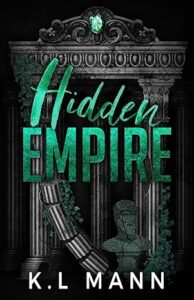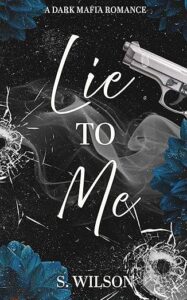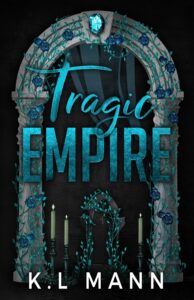“Haven’t seen you let go like that in a while, boss,” Ludo mentioned the next morning as I was sitting on the terrace, eating the breakfast Servio had laid out for me.
It was early, the sun still a pale, unsaturated yellow leaking through the streets of Florence, highlighting the locals who populated San Niccolò and guarded it zealously from the tourists across the Arno. I watched a teenage couple press into each other in an empty doorway, kissing like fools and dressed in disarray as if they were both making their way home after a night of shared debauchery.
I had not even kissed her, yet I felt the way I did the morning after a night of particularly feral fucking. Energized and exhausted all at once. I had not slept more than a handful of hours after we returned home from the restaurant. Murder and dancing with a shockingly erotic slip of a girl were a potent cocktail that left me buzzing inside my skin, as if it were too tight to contain my insides.
I lay awake for hours, imagining all the ways I wanted to have Guinevere Stone and all the reasons I shouldn’t.
The former far outweighed the latter.
Because the only real reason I could cling to was that having a holiday romance with a well-known mafioso was dangerous, even if she did not know I was nella mafia.
But looking into those wide eyes as rich as the earth after fresh rain, I saw too much trust and innocent curiosity to let the ruinous longings in my chest taint such a thing of beauty.
“That asshole deserved it,” I told Ludo finally with a shrug, as if I hadn’t been filled with rage as I beat into Galasso’s ugly mug, leaving it irrevocably uglier than I had found it.
“You know I don’t care much about the why of things,” Ludo admitted. “But what did the poor bastard do?”
I cracked the top off a soft-boiled egg with one strike of my spoon. “He tried to take a woman against her will.”
The sound Ludo made was lupine, a snarling kind of whine like he was both distressed and enraged by the idea. This was why he, Renzo, Martina, and Carmine were my closest soldati. They had a moral compass; it just didn’t point to the usual true north. We had internalized rules, a code adopted from the Camorra but skewed by our judgments.
No harming women or children. No stealing from the old.
These two tenets alone were almost unheard of in our world. The ’Ndrangheta were infamous for abusing their women, but it happened across every clan, and the Mafia made tens of millions of euros every year off scamming the elderly.
We stuck to what I was comfortable with: agromafia business, money laundering, and transportation of every kind of illegal good. These activities were relatively easy to hide or fob off as someone else’s error if we were ever caught, though that had only happened once, in the beginning, when one of our shipments was seized by the Pietra clan on the coast of Pisa. Barrels of cocaine in shipping crates of textiles imported from the United States.
We had blamed it on a scapegoat in the Pietra clan itself and never smuggled goods in that way again.
We had moved on to small electric submarines that came into port at night nearly undetected.
This was the modern Mafia. We avoided warfare in the streets and bragging, obvious symbols of our trade—such as the color red or gaudy gold jewelry—and lived instead like quiet, officious white-collar gentlemen. We rarely met in large groups and communicated through codes that were rewritten every year to keep the Direzione Investigativa Antimafia (DIA) from deciphering our inner workings if they were ever successful at hacking our systems.
So it was not a surprise that Ludo took umbrage at Galasso without having to understand the reason I’d wanted him killed.
That was the kind of trust and loyalty you could not buy with money.
Its only currency was blood.
And once, as a boy, I had saved Ludo from a group of teenage thugs much older than us who decided to attack him for being ungainly and slow thinking. They did not realize, as I had from the start, that a slow processor did not equal stupidity.
Ludo was worth more than fifteen other capos from my territory.
“I would have beat his face in with a hammer,” Ludo told me earnestly, “if I had known.”
I waved away the sentiment. “I know, fratello, but this was for me to do.”
“Because of the girl?” he asked, and when I raised my brows at him as I sipped from my double espresso, he grinned lopsidedly. “Renzo and Carmine watched you in the restaurant. They said you put on quite a show. They said she was pretty like something in one of your expensive paintings.”
I would not mention that I had already searched local auction houses to see if there were any worthwhile paintings of Guinevere’s namesake for sale. It was disgustingly sentimental, but I knew I had to have one for the day when she would leave. If I could not have her, the house could benefit from a symbol of her beauty and innocence.
“She is captivating,” I admitted, staring into the dark coffee the same luxurious shade as her eyes and all that heavy hair. “She makes me curious.”
“About her?”
“Yes,” I mused, almost to myself. “And about me.”
“Buongiorno,” her light voice called from the kitchen a moment before Guinevere appeared in the doorway, dressed in a loose white linen shift dress that seemed precariously close to falling off her shoulders and exposing her entirely. When she turned slightly to face Ludo, I saw the low dip exposing half her unblemished back.
My mouth went dry as dust.
“Buongiorno,” Ludo greeted her, getting up from his lean against the balustrade to cross to her, offering a big, square-fingered hand to her. “Ludovico. Call me Ludo.”
“Guinevere,” she echoed with a jaunty smile, her hand entirely engulfed in his. “Call me Guinevere.”
“You don’t like Gwen?” he asked, dropping her hand and extending his toward the empty chair across from me.
“Not much,” she confessed, walking almost on tiptoe over to her seat. I had noticed she had a way of doing that and wondered if she had been a ballerina or if it was simply to add some height to her short frame. “My parents always corrected anyone who called me that growing up, and my full name kind of stuck.”
“What about Vera?” I asked casually as I plucked a ripe plum from the fruit bowl and cut it neatly into segments with a sharp knife. She watched me intently, tracing the line of the blade as her tongue traced her lips, as if she was seduced by it.
“No one has ever called me that,” she admitted, sitting on her knees on the chair cushion so she could lean across the table to grab the freshly squeezed orange juice. “Is it a popular name in Italy?”
“No,” I mused. “It is mostly used as a word. It means ‘true.’ I thought it was fitting.”
She paused, arm extended, heavy pitcher wobbling slightly in her grip, as she stared at me for a weighted moment.
When she moved again, she poured the juice so quickly it splashed over her fingers, and I had the frustrating joy of watching her lick them clean.
“I’ll allow it, then,” she decided with an impish grin.
I inclined my head, but it only made her laugh.
“You would have continued to call me that anyway, wouldn’t you?”
It was my turn to grin, a curling lift of one side of my mouth.
She clucked her tongue, but when I handed her the bowl, she accepted the fruit I’d cut up for her. I kept one piece for myself, but she leaned across the table to make a swipe for it, so I held it out between two fingers for her to take. I pulled it back when she tried to grab it with her fingers and lifted a brow in silent command.
She rolled her eyes, but there was a tiny grin tucked into the edge of her mouth when she leaned forward on her knees to grasp it between her teeth. Her lips closed over my thumb, plush and damp.
I wanted to see them wrapped around so much more than just my fingers.
“This is how they eat fruit in America?” Ludo asked in his usual monotone way that made it difficult for strangers to understand his sense of humor.
But Guinevere laughed lightly and sank back on her heels, happily munching on the fruit from the bowl. “Sometimes, between friends.”
“Is that what we are now?” I asked, thinking about the fact that I had never danced with a friend the way I had with her last night.
“I think people who dance together so well must be friends,” she quipped, looking at me with an air of deliberation. “What kind of dance was that, by the way? It seemed traditional, somehow.”
“It was, a bit. Not the way we danced it, but the song. It is the ‘Tarantella Napoletana’ from Campania, where my family is originally from.”
I ignored Ludo’s eyes on me, hoping he would leave it alone, but of course he felt compelled to add, “It is a courtship dance.”
I scoffed lightly as I took the last sip of my coffee, but Guinevere’s smile was radiant as she looked into her bowl of fruit.
Why was her shyness so beguiling? Was it that every emotion seemed purer because I knew it had to fight through her natural reserve to shine through? That it felt hard won when so much in my life had come easy?
“Stefania won’t like it,” Carmine said as he swept onto the terrace in a three-piece brown suit with his hair carefully slicked back from his forehead, emphasizing his widow’s peak. He grabbed an apricot from the bowl on the table without even looking at Guinevere and hopped up to sit on the stone balustrade. “She’ll have heard of the American now and already be plotting.”
“Do not be dramatic, Carm,” I ordered. “I know you like life to mirror those absurd dramas you watch on daytime television, but this is not that.”
Ludo grunted. “Stefania makes those women look like sheep compared to a wolf.”
He was not wrong, unfortunately. And there was some merit to her aggression. As the daughter of a Camorra capo in Lombardy, she had been raised around men with blood inked into their skin. It was not fair to assume she would remain untainted by it. It was not right to want her to be either.
But her aggression seemed hollow, a thin armor over an abyss of insecurity that could be easily manipulated.
She did not interest me.
Across from me, Guinevere had lost her smile and was staring into her empty bowl of fruit as if searching for answers.
“I would like to go check into my apartment today,” she said abruptly. “I emailed Signora Verga that I was ill, but I’m better now, and it’s time I got things in order.”
“Order?” Carmine laughed. “Aren’t you on vacation?”
“Yes.”
“Well then, what does order have to do with it?” He spoke English well because his father was a Canadian who had moved to the region years ago after meeting his mother while she was studying abroad in Halifax.
Guinevere sniffed at him in such a haughty, catlike way, I could not help but smile.
“I want to be sure I get to everything I want to do. I’m only here for six weeks, and I wasted one of them being sick and in bed.”
“Ignore Carmine. It is what I do. What is on your list, then?” I asked, disregarding her original entreaty.
For whatever reason, I did not want her to leave the shelter of my roof. Even if I had convinced myself to resist her temptation, I was not immune to this strange, celestial connection between us. It felt like fortuna, like fate. The hand of some greater force playing us both like burattini.
I could not stop wondering if I was meant to know her.
There was this inarguable sense that I had known her before. Or, maybe, that I had been waiting for her all this time without knowing it.
Could a stranger feel so immediately like a friend?
“I want to visit a winery, climb the steps of the Duomo, watch the sunset from Piazzale Michelangelo, spend hours at the Uffizi, eat my weight in gelato, explore the Etruscan ruins at Volterra, visit Siena and San Gimignano and Montepulciano—”
“Bene, bene, basta!” Carmine said, laughing as he held up his hands in surrender. “You have a lot to see and do. I agree.”
“It’s a good thing you have Raffaele,” Martina announced as she joined us on the terrace in her workout kit, glistening with sweat from her morning exercise. Renzo followed closely behind, wet with perspiration too. “He is the best tour guide.”
Carmine snorted orange juice out his nose, and Ludo barked out a laugh.
“I hate to ferry out-of-towners around,” I admitted to Guinevere, who focused on smearing a gob of Nutella on top of a cream-filled Ringo cookie.
“Well, no pressure. I came here alone, and I am happy to travel alone. You don’t need to be forced into my company just because you hit me with your car.”
Renzo laughed into the back of his hand.
“Di classe,” Carmine drawled.
Smooth.
“It is the least I could do, I suppose, after hitting Bambi,” I teased with a flash of a smile that bared my teeth.
I’d noticed that whenever I did that, a flush spilled down her front like spilled wine. It was no different now, the white of her dress emphasizing her blush.
“I wouldn’t want to bother you,” she insisted between her teeth, her gumption fighting through her conservatism.
I felt as I had when I was a boy pulling a girl’s pigtails, giddy and mean.
“Well, I think we are past that, do you not?”
She glared at me.
I glared right back.
Until Martina laughed and clapped her hands. “Perfetto. Today is a good day to show her the wines. You promised Imelda you would visit Fattoria Casa Luna today, anyway. Guinevere can visit while you do business.”
“Fine,” I agreed.
“Can we swing by my apartment first?” Guinevere asked, standing up and fruitlessly trying to brush the wrinkles from her dress.
No.
“Fine,” I repeated, colder than before.
She bit the bottom of her lip, gaze skirting mine before she made her way inside.
My soldati barely waited until she was through the kitchen before bursting into laughter. Even Ludo.
“She is stunning, boss, I’ll give you that,” Carmine said through his chuckles, wiping at his leaking eyes.
“Evil,” I told them in Italian. “Swine.”
“Genius,” Martina quipped, pointing to herself. “Matchmaker. Just promise me when you marry the girl I can be your best man.”
“I believe you all have business to get to? I want to know who the hell this San Marco is by the time I return tonight. And Ludo? Did you find any of Guinevere’s things at Galasso’s residence?”
He shook his head. “Only a photo of her family, I think. Parents and sister.”
I frowned, surprised that the bastardo had sold or thrown out everything that wasn’t of value from her car but kept a silly photo.
“Did you take his hard drive?”
Ludo only blinked dispassionately at me, because of course he had.
“Tell me what you find tonight,” I said as I stood from the table. “He mentioned Leo’s name. Someone call him and find out how well he knew the stronzo.”
“Aye, aye, boss,” Martina agreed. “Now, you have fun on your date!”
I rolled my eyes and went into the cool depths of the house to get ready for my outing, ignoring the way they started gossiping about me before I’d even left earshot.
“Where is the Ferrari?” Guinevere asked when I took her to the garage and led her toward my matte silver Bugatti Chiron.
She eyed the Maserati, the two Lamborghinis, and the Ducati motorcycle almost suspiciously and muttered under her breath, “You could feed a starving nation with the money from these cars.”
“Unfortunately, I do not have an altruistic bone in my body,” I said, unashamed of my excess.
It was not something Italians were made to feel guilty about like they seemed to be in puritanical-leaning America. I worked hard for my fortune and ill-gotten gains. Why should I feel embarrassed about it?
“You helped me,” she reminded me as we got into the leather-scented interior. In the deep bucket seat, her dress rode up to scandalous heights, revealing that while she was short, she had long legs for her proportions.
I wanted to suck bruises into the tender, pale skin of her inner thighs like stepping stones leading toward her sweet figa.
“Exception, not rule,” I said as the car rumbled to life and I pulled briskly out of the garage and through the open gate into gentle midmorning traffic. “As you seem to be for all my rules.”
“Is that a compliment or a complaint?”
“Both,” I decided, sliding a look at her to see the way she bit the edge of her smile.
“So the Ferrari. What happened to it?” she asked again, much to my annoyance.
“You, if you will remember that night last week when you hip checked it.”
She rolled her eyes so exaggeratedly I worried they would get stuck that way. “Har har. Was the damage really so bad? I mean, I did have a mild concussion, but I remember it looking fine, and we drove it yesterday.”
“Fine is not perfect.”
“And it’s perfect or nothing for Raffaele Romano?” she asked, pronouncing my name like a local.
It shouldn’t have been so attractive, the sound of my name in her mouth. But she rolled her r’s as if tasting fine wine, savoring the taste of each syllable.
“You say that like it is a bad thing.”
She shrugged in my periphery as I followed the direction system to the address she’d given me across the Arno for her rented apartment.
“You must find yourself disappointed a lot,” she said, her gaze pressed to the side of my face the way her fingers were the other day to the glass separating her from Florence’s wonders. As if my secrets were just under the skin.
“My definition of perfect is different from yours, perhaps. To me, it does not mean ‘flawless.’ It means ‘enticing,’ so vibrant you cannot help but find it beautiful, flaws and all.”
“And what would you consider a flaw?”
I hummed over that for a moment because too many came to mind, but I did not think she would enjoy my flippancy.
“Stupidity. Willful ignorance. A lack of loyalty to family and friends.”
She flinched as if I had hit her, turning toward the window so I only caught a fleeting glimpse of the self-recrimination on her face.
Uncharacteristically, I did not know what to say. I had not been deliberately insulting as I sometimes meant to be when we bantered, and I was strangely . . . unsettled that my words had hurt her.
The tension in the car mounted as I maneuvered us silently through traffic to the other side of the city.
“Chi sta bene da solo, sta bene con tutti,” I said finally, pushing the words out into the dense quiet between us. “Have you heard of this saying?”
“No,” she said softly without looking at me.
“It means something like ‘If you feel good about yourself, you will feel good about everyone, and they will feel the same way about you in return.’” When she didn’t fill my pause, I sighed. “I did not intend to insult you, Guinevere, and I am sorry that I did nonetheless. I am sorrier, though, that you were so ready to believe I would. That I should even.”
“You were the one who called me an idiota,” she pointed out with a sharp look from the corner of her eye.
I wanted to smile at her show of teeth but refrained. “That was before I knew you. Now I do not think you are stupid or willfully ignorant or disloyal. Naive, certainly. New to Italian culture, clearly. But I cannot think poorly of you in any sense, cerbiatta, and I have only known you for a week. I shudder to think how grand my impression of you will become if I know you any longer.”
She bit her lip to downplay her grin, but there was a noticeable shift in her energy, like sunshine slicing through a dense cloud.
“That was probably, in a very roundabout sort of way, the sweetest thing anyone has ever said about me,” she confessed.
“You should find better company, then,” I said mildly as we waited for the crowds of tourists to cross the street a block away from our destination.
“Sweet,” she echoed softly, turning her pleased expression to the window.
Of course, no one in my life had ever called me sweet. Not even my mother or sisters, who adored me. Even as a boy I had been calculating and brutally honest. I could remember making Delfina cry on her first day of high school because I told her that her perm made her look like Valeria Golino’s ugly sister.
Guinevere was the type of person to look for the good in everything. Even made men with very bad intentions. It didn’t make her stupid exactly, but it did make her easy prey to dangerous men and poor decision-making.
This was especially evident when I pulled in front of the apartment building where she had rented a flat for her six-week summer vacation and found a group of three young men dealing drugs just to the left of the doorway. It wasn’t surprising. Though there weren’t any seriously unsafe areas in Florence proper, the street behind Fortezza da Basso was an open secret with locals who wanted to buy anything from pharmaceuticals to hard-core street drugs.
“Hey, people my age,” Guinevere said happily, perking up from her lean against the window. “That’s nice to know.”
“If you like drugs, perhaps,” I drawled, twisting to raise my brow at her. “You do not look like the average user, but maybe I was mistaken.”
Her mouth dropped into a comical little O of shock. “They’re dealing drugs?”
She whispered the last word as if she could get in trouble just for speaking it.
I was torn between hilarity and rage. “Guinevere, please tell me you were not raised in a convent.”
Her frown was fierce, and she crossed her arms, unconsciously mimicking my own pose. “No. I grew up in a college town, so I’m aware that people do drugs. I’ve never seen a drug deal before.”
Madonna santa, she was so young and unblemished.
So what did it say about me that I wanted to dirty her up with sin?
“Did you research this neighborhood before you booked the flat?”
The knot between her brows tightened. “Yes, Raffa. I’m not an idiot, as you yourself just announced. This area is safe.”
“Says who? The internet?”
“I read like forty forums and blogs from locals,” she retorted.
“Well, one of them should have mentioned this has become a popular spot for drug deals,” I snapped. “With your self-proclaimed bad luck, how long do you think it will take for you to be in the wrong place at the wrong time?”
She rolled her eyes dramatically. “This is Florence. Compared to most other cities in the country, it has a really low crime rate. And don’t even get me started on comparing it to big cities back home in the States. You’re being silly.”
“Silly?” I echoed.
“Si,” she said with a sharp nod. “Sciocco.”
“She ridicules me in my own tongue,” I murmured, once again shocked by her gumption. “You know, most women would thank me for looking out for them.”
“Maybe you should spend the day with them instead.” She smiled sweetly, tossed her hair over her shoulder, and got out of the car.
It gave me time to lock down my grin before I followed suit and joined her at the door to the flats.
“I can meet Signora Verga without your help,” she groused.
I ignored her, but when the buzz sounded and the door unlocked, I did not immediately follow her into the building. After catching the door before it could close, I wedged a loose brick into the jamb and then turned to face the cluster of young men a few yards away.
They did not notice me approaching at first. Probably because they were high.
But when a skinhead caught sight of me, he glared and nudged his friends with his elbows.
“Hey, asshole,” he called in Italian, thin chest puffed out, a fanny pack worn crossed over it in the style of trendy teenagers. “What the fuck do you want?”
It was an easy mistake to make. A young man thinking he could prove himself by throwing words like knives at a well-dressed civilian walking down the street. An easy mark for an unprovoked attack that would make him cool to his friends in crime.
Only I wasn’t a civilian.
I was a camorrista, a capo dei capi of my territory.
I had the satisfaction of watching his bravado crack down the middle when I continued my quick, strong strides toward him. It crumbled completely when one of his friends turned, saw me, and gasped before muttering quickly, “È il gentiluomo mafioso.”
The Gentleman Mafioso.
Such a stupid nickname, but one my best friend had given to me the first time I killed a man in cold blood. It was my eighteenth birthday, and my father told me if I wanted to be allowed to leave the country for college, I had to prove my loyalty to the family.
And nella mafia, the only way to prove anything was to write it in blood.
To this day, I have no idea what the poor bastardo had done to cross Aldo Romano, but that was the point. A loyal member of the Camorra followed orders without needing context.
I was dragged out of bed at dawn by my father, still in boxers and bare feet as we crossed the courtyard into the rows of vines separating the main house from the barn. A man was waiting within, tied to a chair, wearing a stained, ruined suit that had once been worth a lot of money. My father’s consigliere, Tonio, was there, and, shockingly, my best friend, Leo.
It was Leo, stern faced, who handed me the gun.
“Kill him,” my father had ordered as he sat in a wooden chair at a table near the back wall set with a moka espresso maker and a hand-painted ceramic cup and saucer.
He proceeded to pour himself an espresso and ignore us entirely, looking over documents someone had left for him to peruse.
“You have to,” Leo told me in a quiet murmur before Tonio reeled him to his side with a hand on his shoulder.
“Please,” the man who had wronged my family begged as I stepped closer. He was much older than me, his skin sallow and flaccid from too much drink. There was a fine sheen of grease on his flesh from old sweat merging with new, and a dribble of blackening blood on his mouth. “Please, I have a family.”
I could still remember the weight of the gun in my hand, how warm it was from Leo’s grip before mine. I’d been taught to shoot almost as soon as I could walk, so it felt natural in my hand, the way a glove might feel to a sportsman.
Except this was the only sport I’d ever been trained at.
Before I killed him, I took the tie from around his neck. I loosened the knot and stuffed the Gucci silk inside his mouth so he’d stop his pleading.
It meant nothing to me because it meant nothing to Aldo and Tonio.
He thought I had the power to change his fate when I was already struggling to swim upstream against my own.
I took two steps back and shot him through the forehead, right between the eyes.
My father wasn’t pleased.
“Too easy,” he muttered in disgust as he narrowed his eyes at me. “What kind of message is this to send our enemies?”
To appease him, because I wanted to go back to the big house for breakfast with my mother and sisters, I yanked the hunting knife from zio Tonio’s belt and carved a message into the dead man’s forehead.
Traditore.
Traitor.
When Tonio, Leo, and I carefully staged his body back in his apartment, I took care to clean him up and set him perfectly behind his desk. Aside from the lurid red gouge marks in his forehead, he could have been sleeping.
Some reporter called the killing almost gentlemanly for a Mafia hit.
Unfortunately, the moniker stuck.
“Good,” I told the thugs as they tensed for flight, sensing a bigger predator in their midst. “You know who I am. So you will understand how serious I am when I say if any of you so much as look at the small brunette who just entered Signora Verga’s apartments, I will skin you alive and then play mix and match with your flesh until you are each dressed in another man’s face. Do you understand me?”
The skinhead’s mouth had fallen open on the broken hinge of his jaw. “Yeah, yeah, man. No worries.”
“D-do you need us to like . . . look out for her?” an acne-faced boy worked up the nerve to ask me.
I considered it for a moment and shrugged. “If you want to, it would not go unforgotten.”
Though I was one fucking mishap away from telling Guinevere she was spending the next five weeks under my roof.
The kids stammered their agreement and skittered away with one wave of my hand. I shook my head as I made my way back to Verga’s building and pushed through the door. Kids like that were usually prime pickings for soldati, but not in my outfit. We played sharp and smart, which meant teenage wannabe badasses were exempt from our ranks. I let Damiano pick them up in Naples and put them through the wringer before I ever thought about accepting them into the fold.
The Romano family had more college graduates than a prep school.
It was the key to our success and our subtlety.
The soft lilt of Guinevere’s American accent reached me in the foyer, and I followed it up two flights of stairs to the open doorway of an apartment. The entire thing was visible from my position in the frame: a small kitchenette with a half fridge to the right, a tiny table for two, a lumpy blue love seat and ancient television with rabbit-ear antennae to the left, and a double bed with a brass headboard at the back of the room beside a hand-painted chest of drawers. The postage-stamp size, along with the lingering scent of heavy Middle Eastern spices from the shawarma place down the street, lent it a distinctly unappealing air.
Guinevere, though, seemed to think it was fabulous.
“It’s fabulous,” she crowed, clapping her hands together as she stood in the middle of the room with a bright smile, as if Signora Verga had shown her the wonders of Michelangelo’s David. “I can’t believe I get to live here.”
Signora Verga smiled at her widely, caught up in Guinevere’s enthusiasm as it spilled out of her like sunlight. “Si, si, very lucky. You be happy here.”
“I will,” Guinevere agreed, touching the windowsill gently, giving it a caress as if it were sentient. “Thank you for renting it to me. I’m so sorry I wasn’t able to get here sooner.”
“No, you explain,” Signora Verga said, waving off the apology.
“Signora Verga,” I said in Italian, startling both women who turned to face me with hands over their hearts. “I assume you know about the boys who loiter outside your apartment selling drugs?”
The older woman’s finely lined face creased like a crumpled silk scarf. “They aren’t bad boys.”
“Oh?” I asked, crossing my arms as I leaned into the frame.
“Not like your kind,” she said, brave in the way of all older people, close enough to death to disregard danger.
“My kind? Hmmm.” I looked at Guinevere, who was frowning slightly as she struggled to keep up with the conversation. “My kind saved this girl from a worse kind of man and kept her safe this last week.”
“Then you know not all men who do bad things are rotten in their hearts,” she rebutted smugly, sniffing in triumph.
Amusement tickled the edge of my mouth, but I kept it firmly pressed shut.
“I like it here,” Guinevere told me, crossing her own arms to stand off with me. Given she was five foot nothing and light as a feather, it was laughable but oddly endearing. “I searched for ages until I found somewhere this cute that I could afford in the center of Florence.”
I leaned forward to inspect the lock on the door, lifting the latch and then dropping it to hear the squeal of the rusted hinge. Without saying a word, I looked back at her with a raised brow.
Her arms tightened protectively over her chest. “If Signora Verga is safe here, I’m sure I will be too.”
“Signora Verga isn’t an exquisitely beautiful young woman with more courage than sense,” I drawled.
“Raffa,” she gasped. “Don’t be rude.”
I almost laughed at her outrage when I had just given her one of the nicest compliments to ever leave my lips. She had all the indignation of a wet cat, and I found myself ridiculously attracted to that stubborn nobility.
“It’s true.” Signora Verga allowed with a dirty look my way that shifted to a sweet smile for Guinevere. “I am old now, not young and pretty like I once was.”
I turned my snort of disbelief into a short cough, but Guinevere saw through my ruse and leveled me with a glare.
“You’re lovely,” she declared. “And so is this apartment. I can’t wait to settle in.”
Something strange happened in my gut, hooks ripping up the lining of my stomach as if something was being forcibly dislodged.
“You are not staying here tonight.”
She pressed her lips into a flat line at my tone, which I could admit was the same one I used when ordering my soldati.
“Why not?” she asked in an excessively reasonable manner. “I’m no longer sick, I have clothes, and you kindly lent me some cash that I’ll be able to pay you back for next week when I get my expedited replacement passport. In fact, forget about taking me on your work trip to the winery. I can go another day by myself to one of my own choosing. You’ll be happy to be free of the American idiota.”
Wasn’t that the million-euro question.
Why didn’t I want to be free of her?
I hadn’t been home to Villa Romano in two weeks, the longest stretch of time I’d spent away from my family since the death of my father. The Pietra scum were peeking their ugly mugs out of the ground with their sights set on revenge and taking over my territory. Mama and Stefania were convinced an arranged marriage between Stef’s family and my own would solidify my power base and provide long-awaited babies.
I was a capo with real-life fucking problems.
So why did I want to continue this farce of playing Prince Fucking Charming with this American girl?
“Lasciaci,” I told Signora Verga.
Leave us.
She sniffed at me again, shot a look at Guinevere like she was tossing her a lifeline, and then shuffled out of the apartment in her slippers.
I didn’t close the door behind me, but I didn’t need to.
Instead, I held Guinevere’s long-lashed brown eyes and stalked slowly toward her. She held her ground, tipping her chin up when I loomed over her so she could maintain eye contact.
She opened her mouth, no doubt to use her sharp little teeth to take a bite out of my bossy ass, but I silenced her by pressing my index finger to her mouth.
“I have gone to great lengths to take care of you, cerbiatta,” I murmured, moving my hand from her closed mouth to trace the line of her cheekbone up into the loose hair over her ear. She shivered slightly when I hooked a lock with my finger and pressed it behind the delicate shell. “I find myself . . . invested in your well-being now.”
“Financially,” she quipped, but the word was too breathless to be punchy.
“I have invested more money in many more things, and they could go bankrupt tomorrow without me giving a single fuck,” I admitted.
“A rich man.”
“Yes, and oftentimes, a bored man.”
“I’m not a toy, you know.” She rolled onto her tiptoes, but she was still so short she had no hope of intimidating me. “I’m not . . . some bambolina you can just dress up and play with.”
I smirked a little because it was cute she was so excited to spit my words from last night on the dance floor back at me.
“No?” I murmured, sliding my entire palm under the heavy mane of hair against her neck, my thumb placed intimately over the thrum of her pulse. “You would not like to be my doll, sometime? Dressed in red, all this hair spread out on my pillow, your thighs spread for the weight of me between them? You did not enjoy being pressed against me while I led you through a dance that made your nipples bead behind the fabric of that pretty dress?”
An almost violent shiver rattled her slim shoulders, but she set her teeth against the physical mark of her desire. “I told you, I’m not a prostitute.”
“Did I say you were?”
“You implied it by saying you’ve invested in me and now you want a return.”
“I do not know the kind of men you have in America, but in Italy, a man is honest about his attraction. I find you . . . incantevole. Do you know what that means, Guinevere?”
“No,” she whispered as my thumb stroked gently back and forth over her thudding pulse point.
“It means beguiling. Enchanting. And for a man like me, that is dangerous. I cannot afford distractions, but here I am in this ugly apartment feeling . . . unsettled because you are suggesting I will not see you again when all I want is more of you.”
“In the biblical sense?” she asked, a little lost and entirely aroused.
I didn’t leash the grin that spread warm and dark across my face. “Si, certo, one day. But until that day, I want to see you in a field of poppies as red as that dress. I want to take you to dinner at my favorite trattoria because I can imagine the face you will make when you try true bistecca alla Fiorentina. I want to finish reading Dante’s Inferno to you before we walk through his house together here in Firenze. I want to witness you falling in love with my country because I think you could make this bored man fall in love with it again too.”
“Oh,” she mouthed, searching my gaze for something I both wanted her to see and desperately wanted to hide.
See the me I used to be, I thought, the young college Raffa with charm and swagger and a zeal for life that entranced people into his orbit.
Don’t see Raffaele Romano, the cold, dark metal of a man made into a weapon.
“What are you asking me, exactly?” she asked, reaching up to gently grip my wrist below the hand framing her throat.
When she pressed her thumb to my pulse, it felt as if a loop closed between us. Our hearts, when I took a moment to observe, beat in perfect bass-note harmony.
“I want to know you,” I admitted, even though it felt like a confession and I had stopped going to church for those such a long time ago I could not remember. “Will you let me?”
“Will I get to know you too?” she asked, and if I had thought she was clever before, I knew it for certain then.
Because it was not a given this knowing would go both ways.
In fact, it absolutely would not.
But I’d avoided indulging in anything for so long, the temptation to do so now was physically overpowering. It burned in my gut and quaked in my bones. It echoed in the beat of my blood knocking against Guinevere’s thumb.
Do something for yourself. Take something for your own.
Know her and let someone, just one person, know you too.
“Si,” I whispered, as I pushed her hair behind her back, leaving her neck warm from my grip but bare for my lips as I sealed my promise with a kiss. “You will.”













